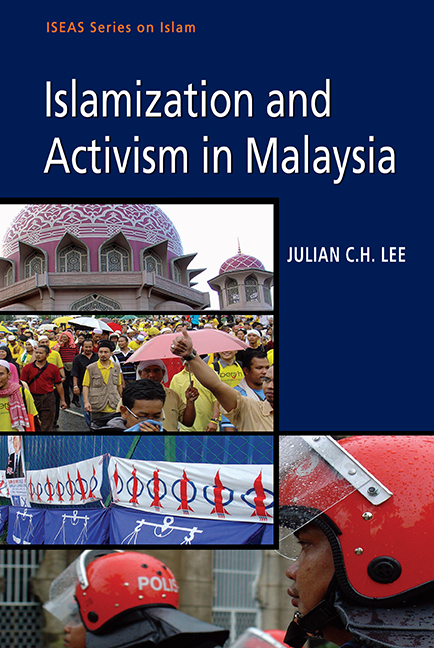Book contents
- Frontmatter
- Dedication
- Contents
- Acknowledgements
- Abbreviations
- Introduction
- 1 On Islam, Democracy, and Activism
- 2 A Short History of Malaysia
- 3 Malaysia as an Islamic State: The Debate
- 4 Conflict of Jurisdiction: Civil versus Syariah Law
- 5 Islamist Lawyers’ Views
- 6 Social Activism and the Article 11 Coalition
- 7 Questioning Orthodoxies, Criticizing Zealotry
- 8 Electoral Engagements
- Conclusion: Islam, Democracy, and Activism in Malaysia
- Bibliography
- Index
- About the Author
- Plate section
7 - Questioning Orthodoxies, Criticizing Zealotry
Published online by Cambridge University Press: 21 October 2015
- Frontmatter
- Dedication
- Contents
- Acknowledgements
- Abbreviations
- Introduction
- 1 On Islam, Democracy, and Activism
- 2 A Short History of Malaysia
- 3 Malaysia as an Islamic State: The Debate
- 4 Conflict of Jurisdiction: Civil versus Syariah Law
- 5 Islamist Lawyers’ Views
- 6 Social Activism and the Article 11 Coalition
- 7 Questioning Orthodoxies, Criticizing Zealotry
- 8 Electoral Engagements
- Conclusion: Islam, Democracy, and Activism in Malaysia
- Bibliography
- Index
- About the Author
- Plate section
Summary
I begin this chapter by describing the views of the Muslim women's NGO, Sisters in Islam (SIS). This high-profile NGO undertakes advocacy work surrounding women's rights in Islam and conducts educational trainings, one of which I describe below.
Like many Malaysian Muslims, of concern to members of SIS is the apparent conflation of Arab culture with Islam. This is sometimes referred to in Malaysia as the Arabization of Islam. This conflation is often associated with a conservatism that appears to be becoming increasingly liable to enforcement by State apparatuses. In this chapter I recount a raid of a nightclub by the Jabatan Agama Islam Wilayah Persekutuan (Federal Territory Islamic Department). Finally I explore the responses to this incident from different quarters of Malaysian society.
GOING BEYOND THE QURAN
On 12 June 2004, Farid Esack, a South African activist and academic, gave a talk at the Malaysian AIDS Council in Kuala Lumpur. He suggested that a pandemic such as AIDS raises theological issues. One issue he raised was that Muslims are supposed to be silent about their sins. He recollected a Hadith, a report of a saying or deed of the Prophet Muhammad, which he prefaced by noting his wariness of Hadith because one could be found in support of almost any position one cared to take. This Hadith was to the effect that the Prophet attempted to ignore a man who voluntarily confessed to zinna (illicit sexual conduct) to him. Only after the man's insistence and his fourth confession did the Prophet enforce the relevant punishment. But with AIDS, said Esack, the silence that appears to be encouraged in this Hadith through the example of the Prophet's apparent disinterest in this confession could lead to death.
Esack also raised the issue of sexuality in Islam. Muslims who oppose homosexuality frequently cite verses 11:77–83 from the Quran as the justification of their view. These verses recount the story of Lot in which Sodomites and Gomorrahans are destroyed because of, it is frequently held, the residents’ homosexual behaviour. However, Esack recalled the images of sexually humiliated Iraqi prisoners from Abu Ghraib.
- Type
- Chapter
- Information
- Islamization and Activism in Malaysia , pp. 98 - 109Publisher: ISEAS–Yusof Ishak InstitutePrint publication year: 2010



